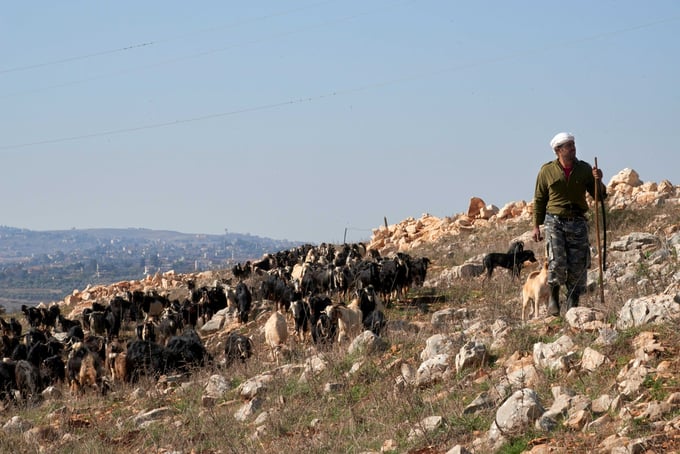May 29, 2025 | 18:52 GMT +7
May 29, 2025 | 18:52 GMT +7
Hotline: 0913.378.918
May 29, 2025 | 18:52 GMT +7
Hotline: 0913.378.918

Thirty percent of population in Lebanon faces acute food insecurity as 2025 begins, malnutrition risk remains.
Nearly a third of Lebanon’s population is facing acute food insecurity following the escalation of conflict in late 2024 and recovery from the impact of hostilities on agriculture and the economy is likely to be slow, according to a new food security assessment.
The Integrated Food Security Phase Classification (IPC) analysis on Lebanon, developed by FAO, WFP and the Ministry of Agriculture, shows that some 1.65 million people in Lebanon are now facing crisis or emergency levels of food insecurity (IPC phase 3 or above), up from 1.26 million before the escalation. Meanwhile, 201,000 people are grappling with emergency levels (IPC phase 4), twice the number before.
"Lebanon’s worsening food security is no surprise," said Matthew Hollingworth, WFP Representative in Lebanon. "Sixty-six days of war, preceded by months of conflict, have shattered lives and livelihoods. While some can return home after the ceasefire, others face the harsh reality of having no home left to return to. At this critical moment, our mission is clear: to support the Government and the people in rebuilding their lives and food systems”.
The report projects that food insecurity is expected to persist over the next three months, with no short-term return to pre-crisis conditions. With challenges ahead, ongoing humanitarian efforts in supporting recovery will be critical."The escalation of hostilities has severely impacted farmers' livelihoods, as well as agricultural assets and infrastructure, leading to heightened food insecurity and threatening the sustainability of farming activities," said Veronica Quattrola, FAO Representative in Lebanon a.i. She added, "FAO is steadfast in its commitment to helping farmers resume production and supporting communities in rebuilding and enhancing their resilience."
Lebanon’s refugee populations are particularly at risk, the report noted. Some 594,000 Syrian refugees (40 percent of the Syrian refugee population) and 89,000 Palestine refugees (40 percent of the Palestinian refugee population) are classified as facing IPC Phase 3 (Crisis) or above. Some 970,000 Lebanese residents (25 percent of the population) are in the same bracket.
The conflict has severely disrupted economic activity and livelihoods across all sectors, the report said, noting that markets were still struggling to get back on their feet despite the November ceasefire. The sharp downturn deepens what was already a protracted economic crisis. The Lebanese economy has contracted by 34 percent in real GDP since 2019, with investments stagnating.
Malnutrition continues to pose a significant risk in Lebanon, particularly among children, adolescents, and women. A recent study revealed that three in four children under the age of five are eating diets with very little diversity, leaving them vulnerable to stunting and wasting.
In 2024, WFP provided food assistance to 750,000 people displaced by fighting, supplying hot meals, food supplies and cash assistance to people in shelters and communities across Lebanon. This year it plans to assist 2.5 million people, including almost 900,000 Syrian refugees in Lebanon.
The caretaker Minister of Agriculture, Dr. Abbas Al-Hajj Hassan, emphasized the importance of sustainability, transparency, and trust in agricultural projects, highlighting the meeting as a result of extensive efforts and strong partnerships among stakeholders. He stated: "These partnerships strengthen our nation, which needs support from international bodies and local partners. Sustained cooperation is key to achieving sustainable development for Lebanon's agricultural sector." Dr. Al-Hajj Hassan underscored the national significance of assessing damages caused by the Israel war with Lebanon, noting: "This process began on day one of this war, resulting in joint technical committees with international organizations and local partners, enabling effective assessments”. He affirmed the project’s goal of compensating affected farmers: "Our priority is securing funding for damages, and we will work tirelessly to achieve this." He concluded by reaffirming the ministry's commitment to sustainable agricultural development and collaboration with all partners to address Lebanon’s challenges.
Prior to the intensification of the conflict, 23 percent of the population (Lebanese, Syrian, and Palestine refugees) was already classified as IPC Phase 3 or above (April–September 2024), totalling 1.26 million acutely food insecure.
(FAO)

(VAN) Ms. Nguyen Thi Dung, Deputy Director of Ngoc Hoang Cooperative, shared about the journey of bringing dragon fruit to Europe, achieving annual revenues in the billions of VND.

(VAN) Bamboo products from Thang Tho Bamboo Cooperative have reached many countries around the world, while also creating jobs for local workers.

(VAN) The Management Board of Con Dao National Park reported that a green sea turtle, tagged in the Philippines, has traveled thousands of kilometers to lay 84 eggs on Bay Canh Islet.

(VAN) Green technology is paving a new path for sustainable aquaculture in the Mekong Delta in particular and across the country in general, helping reduce emissions and adapt to climate change.

(VAN) On May 27, La French Tech Vietnam (the French startup and innovation community in Vietnam) held the French Tech Summit Vietnam 2025.
/2025/05/27/4731-2-223159_980.jpg)
(VAN) No votive paper, no styrofoam, no plastic bags, no plastic bottles, and no single-use plastic trays are the key rules tourists should keep in mind when visiting Con Dao.

(VAN) In the fight against plastic pollution, Vietnam has been demonstrating a proactive, pioneering, and active role in addressing the greatest environmental challenge today.